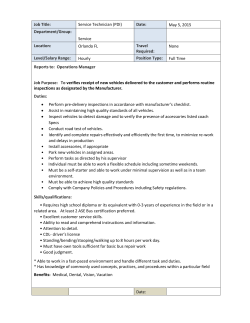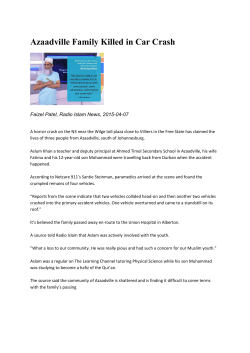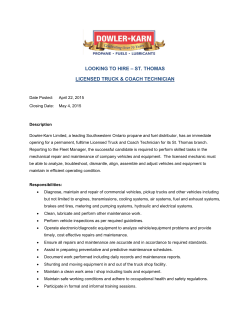
Monitoring the Use and Management of Government Vehicles in the
PTF Case Study Series No. 4 Monitoring the Use and Management of Government Vehicles in the Philippines CSO: Years: Country: Amount: Environmental Cooperation and Linkages Inc. (ECOLINK)/ PCDSI 2006-2007; 2008 (phases 1 and 2) 2011-2012 (current phase 3) Oroquieta, Philippines $46,368 USD (phases 1 and 2) $39,500 USD (phase 3) Sector: Civil Society Monitoring of Public Procurement and Auctions Abuse and mismanagement of official government vehicles Corruption Problem: Tools employed: Community Mobilization, Third Party Monitoring, Capacity Building, Participation & Consultation, Constructive Engagement, Advocacy Corruption Problem Addressed logos on vehicles. Officials furthermore do not comply with the mandatory use of trip tickets and with passenger regulations. In addition to addressing specific instances of corruption, Bantay Red Plate also reviewed existing policy and feedback mechanisms and the enforcement of rules and regulations related to fleet management. The on-going project was preceded by two earlier PTF-supported projects that served to pilot various approaches in three towns on the southern island of Mindanao. The Actions Taken by ECOLINK Abuse of government vehicles (all of which carry red license plates) is rampant in the Philippines. The Bantay Red Plate Project demonstrates how this problem has been tackled at the local level through a CSO-led community effort and how the once small project is currently being scaled up to a nationwide campaign covering 45 cities in the Philippines. The project has successfully secured buy-in to its innovative methodology. project has been designed to address the massive corruption of funds in the areas of procurement, management, use and maintenance of vehicles by local governments (LGUs or Local Government Units). Vehicle procurement is beset by overpricing and lack of transparency in the process while gasoline reselling has also proven a serious issue. In the actual use of vehicles, public officials have been notoriously ignoring policies prohibiting the use of vehicles beyond office hours and outside of the regular work environment. There is widespread non-compliance of government bodies with the mandatory placement of "FOR OFFICIAL USE ONLY" stickers and agency www.ptfund.org At the core of the project is the empowerment and mobilization of citizens. Toward this end, Ecolink organized activities ranging from Anti-Corruption youth concerts, mounting posters and billboards, to facilitating the airing of Anti-Corruption radio programs in Bantay and capacity-building on the theme of legal and ethical standards in vehicle use, among many others. Workshops were conducted to build skills in expenditure analysis and policy formulation. Citizens were mobilized to monitor actual vehicle use and cases were filed with the Ombudsman. Furthermore, the project pursued Supporting Citizens Against Corruption | 1 legal and administrative reforms through activities such as an LGU vehicle ordinance formulation workshop and LGU vehicle inspections. Ecolink has developed partnerships with CSOs around the country and continues to build their capacity through training workshops on corruption prevention, use and dissemination of LGU AntiCorruption toolkits, the set-up of a hotline interlink with the office of the Ombudsman, resource generation seminars and knowledge sharing workshops with CSOs. To date, the project involves strategic collaboration among Ecolink, the Department of the Interior and Local Government (DILG), the Land Transportation Office, Commission on Audit, Highway Patrol Group, and the Department of Education as well as other national line agencies and donor institutions. CSOs from all over the country are capacitated to undertake various monitoring actions and provide training to LGUs on Fleet Management. The goal of magnifying the recent project impacts to a nationwide level builds on this successful collaboration between the many stakeholders engaged. Impact and Results Achieved procurement processes have become more transparent and citizen volunteers have started participating in the LGUs’ bids and awards committees. Another result of the first two phases has been Ecolink’s own organizational growth and strength development. The credibility built and recognition received has encouraged Ecolink to scale up the project to a third phase covering at least 45 cities nationwide! To successfully scale up, Ecolink identified the need to formalize its constructive engagement with the DILG and a Memorandum of Agreement (MoA) was signed between DILG, Ecolink and PTF. Ecolink has started mobilizing CSOs from the three island groups of Luzon, Visayas and Mindanao to cover the 45 municipalities envisioned for scale-up. Widening the reach of its policies, the aim is for DILG to pass a circular that will reiterate and consolidate policies concerning the proper procurement, use, management and maintenance of vehicles. The following observations are salient lessons learned that have enabled Ecolink to further scale up Bantay Red Plate. They include: Projects that start up small, identify indicators, measure results and include stakeholders from the beginning on, have a better chance of being replicated The first and second phase of the project developed monitoring tools and techniques and tested them. The project design provided for a measurable outcome indicator in the form of public expenditure savings and this gave Ecolink the leverage for project expansion. A firm yet sensitive approach Citizen-driven campaigns against corruption may encounter fierce and at times violent responses from bureaucratic institutions. The Bantay Red Plate project has experienced this The first and second phase of the project, focusing on three towns in the war-torn area of Mindanao, has resulted in public expenditure savings of approx. $250,000 USD compared to a project expenditure of $70,000 USD. As a result of the interventions directed toward raising citizen awareness and enhancing local policies, the three LGUs targeted have passed ordinances that outline the dos and don’ts in vehicle use and establish concrete mechanisms for the resolution of corruption cases. Citizen participation in tracking the proper use of vehicles has been wide-spread, spontaneous and phenomenal in its impact with more than 1000 citizens participating. Vehicle www.ptfund.org Supporting Citizens Against Corruption| 2 also. However, with firm resolve and commitment, coupled with sensitivity to cultural and normative conditions of the project area, the demand side has eventually created sufficient pressure, a critical mass, for local executives and government officials to ultimately do what is right and comply with laws and regulations. flexibility to implement their local project in a manner suited to the area’s concrete conditions. Documentation Project completion reports (PCRs) and Project completion assessments (PCAs) can be accessed at www.ptfund.org under the “Where-we-work” tab. The vehicle monitoring guidelines can be accessed at www.pcsdi.org For additional information, please contact info@pcsdi.org Signing of the MoA – Ecolink’s Paul Gangoso and DILG’s Jesse Robredo Champions create champions A government official who sets an example among fellow public servants truly inspires others to become champions of good governance themselves. After all, the presence of champions within government agencies makes the role of CSOs in public reforms a lot easier. Ecolink’s experience with Bantay Red Plate has shown how a local champion, in this case Dr. Gemma Los Baños, a senior government official who endorsed and supported the project, has influenced countless others to become devoted volunteers and strengthen the project. Thus, for a project to be scaled-up, the presence of champions is crucial. Partnership among CSOs When scaling-up, a project must consider engaging support from and partnership with other CSOs. These partnerships should be on the basis of mutual cooperation, respect and recognition. They should also give partners the www.ptfund.org Prepared by: Paul Gangoso, Ecolink/PCSDI; Gerry van der Linden, PTF; Johannes Tonn, PTF Supporting Citizens Against Corruption| 3
© Copyright 2025










